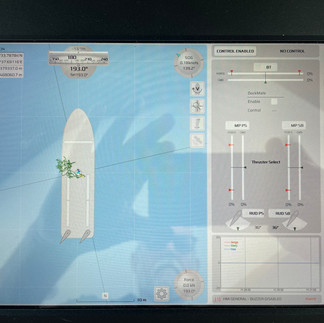Not all GPS Instruments Are The Same!
- Sep 29, 2024
- 2 min read
Vanguard uses Praxis's commercial-grade Dynamic Positioning system, typically destined for an oil field supply boat. Our props are quite close together, so maneuvering on the throttle does not work well; we must use thrust over the rudders. The DP lets us move those rudders independently, providing both side thrust and station keeping. The system relies on a GPS signal to understand its position and avoids more complex options such as cameras or LIDAR.

Our GPS signal initially came from a Furuno PG700 Fluxgate compass, which we used during our initial commissioning. The compass was made active in port and connected to a Time Zero chart plotter that recorded the signal over a few days.
The GPS fix appeared like a ball of wool, showing a deviation of about 15m or 45 feet over time. This unexpected result is concerning, given our system's heavy reliance on the GPS signal for accurate positioning. A 15m deviation could mean the difference between a good day and a good insurance claim!
The next step was to switch the GPS signal source to the Furuno SCX-21 GPS Satellite Compass (Furuno claims a GPS accuracy of 5m). As depicted in the enclosed (green) plots from the DP System Control screen, the results show a significantly tighter grouping within our deck area. Additionally, some of the tracking is real, as we are stern-to-stern moored in a typical Mediterranean style and subject to ocean swells refracting around the harbor.

As a belt and braces approach, we opted to keep both instruments live to retain redundancy. Fluxgate (Red track) is connected to our Time Zero chart plotters, where the variation has no real meaning; the Satellite Compass (Green track) is linked to the DP Display. So cross-checking is simply a matter of looking up from one to the other.
Wrap up
Vanguard is now at a point where we can view her as seaworthy, five months work with a one-month break in the USA. Employing subcontractors in Antalya, Didim, and Palma, help from friends and family, and staff at Naval. The DMS stabilizers were the only system we did not touch, and they worked right out of the box.
Our remaining week in Palma will see final projects on the electrical system, replacing the cabinet latches in the galley, a run-through remaining exception on our MCA Survey, and a few further odds and ends. Then, we are off to cruise Menorca with family before shipping her to the USA for a winter in the Caribbean. Her shallow drafts will be handy in the Exumas.










Those fluxgate compasses can be affected by nearby metal structures, causes them to wander which is a bit of a bind when using the autopilot! What was the quayside made of?